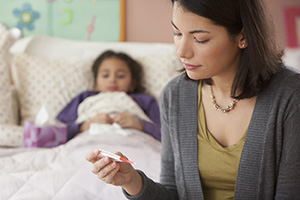Home Care for Children with Sickle Cell Disease
Sickle cell disease (SCD) is an inherited disorder in which red blood cells become C-shaped. This causes impaired blood flow, pain, and other health problems. Symptoms may show up by about 5 months of age.
A child who has sickle cell disease should be under a health care provider's care. But parents can do many things at home to reduce symptoms and maintain the child's health.
Take steps to prevent infections
Infections like the flu can be dangerous for children with sickle cell disease. Children and their caregivers and family members should wash their hands several times a day with soap and clean, running water. This is to reduce the spread of the flu virus and other germs.
Children with SCD are at more risk of illness from salmonella. Salmonella is a type of bacterium. To prevent salmonella infection, your child shouldn't eat raw or undercooked meats or eggs.
Make sure your child's vaccines are up-to-date. Make sure your health care provider is aware your child has SCD. The vaccines given may be slightly different for children with this disease.
Take fevers seriously

Children with SCD are at risk for infections. If your child has a fever of 100.4°F (38°C) or higher, contact your child's health care provider for advice. Don't simply treat your child at home with fever-reducing medicines. The fever could be a sign of a more serious problem. If your child has no fever but doesn't look well to you, trust your instinct. Call their provider right away or bring your child to the emergency room.
Be aware of your child's surroundings
Extremely hot or cold temperatures may trigger a sickle cell crisis. A sickle cell pain crisis is a sudden episode of pain all over the body. To keep your child's body temperature at the best level, always make sure they wear a coat during cold weather. And have them spend as much time as possible in air-conditioned areas on very hot days. Staying well-hydrated in hot weather may reduce the risk of a sickle cell crisis.
Learn how to manage pain
Children with SCD will sometimes have pain episodes. Talk with your child's health care provider about the best ways to handle these episodes at home. It may be appropriate to give your child pain-relieving medicines like ibuprofen for mild episodes. Or you may be able to give them stronger pain relievers for more severe flare-ups. Heating pads, warm baths, and massage may also be soothing.
Maintain healthy habits
Make sure to introduce healthy practices into your child's daily life. Drinking plenty of fluids to help prevent dehydration and eating a balanced diet are important. Children with SCD should also take part in physical activity and stay active. Rest breaks are advised. This is so your child doesn’t work too hard or get overly tired or dehydrated.
Reach out to support groups
Children with SCD, especially teens, may have a hard time coping with their condition because it can cause delayed puberty. They may also feel anxious about having sudden pain episodes. Support groups for children with SCD can be helpful in learning ways to cope with these situations. Also, these support groups can be helpful for simply sharing their worries with other kids who have similar concerns and feelings. Ask your child's health care provider or someone at your local hospital for advice on finding a group in your area.
Keep all follow-up appointments
SCD is a complex illness that needs close medical management. Keeping follow-up appointments is key to your child's health. It also gives you the chance to ask your child's health care provider about current and new treatments. For example, new gene therapies have been approved to treat SCD. Talk with your child's provider about these treatments.
Connect with us:
Download our App: